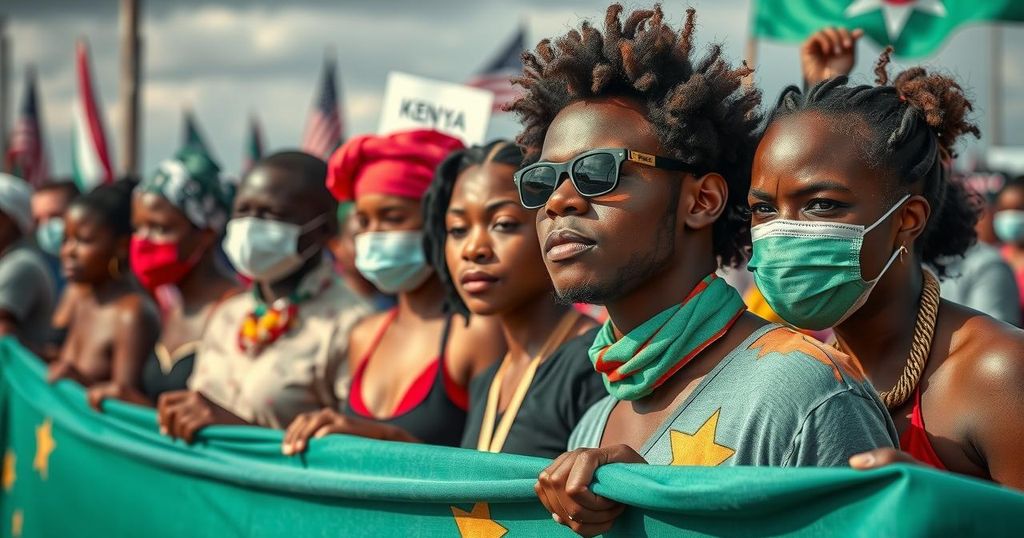Kenyans in Australia protested in Darwin against rising abductions back home, demanding action from President William Ruto. This demonstration is part of a broader diaspora movement advocating for accountability and reform. Protestors expressed frustration over deteriorating conditions in Kenya and appealed to the Kenyan High Commissioner for support. The protests reflect a growing trend of diasporic activism addressing issues affecting their homeland.
In Darwin, Australia, members of the Kenyan diaspora organized a protest on Monday morning to voice their growing concerns regarding the alarming rise in abductions occurring in Kenya. Demonstrators carried placards bearing the names of youths who have gone missing since December, demanding immediate intervention from President William Ruto to tackle the escalating security crisis. Visuals shared on social media depict protestors chanting slogans against the government while emphasizing the urgent need for effective security measures to be implemented.
This protest reflects a broader movement initiated by Nelson Amenya, a whistleblower in the JKIA-Adani deal, who has called for the global Kenyan community to unite against the issue of abductions. Amenya has participated in similar protests in Paris, underscoring the international dimensions of the diaspora’s outrage and advocating for the EndAbductionsKE campaign—a movement that recalls previous protests against the Finance Bill in June 2024.
Participants at the Australian protest have articulated their frustrations regarding the deteriorating conditions back home, despite their physical distance from Kenya. A protestor underscored the urgent necessity for change by citing economic difficulties and oppressive governance as fundamental issues. Another attendee mentioned the escalating anxiety among the diaspora, who remain closely connected to relatives in Kenya, particularly in light of the rising unemployment rates and government repression of public dissent.
Moreover, protestors appealed to Kenya’s High Commissioner to Australia, Dr. Wilson Kipngetich Arap Kogo, requesting his support for their advocacy efforts. This appeal signifies the diaspora’s intention to utilize diplomatic avenues in amplifying their calls for accountability and reform in Kenya.
This demonstration is part of a growing trend of activist mobilization among the Kenyan diaspora, accompanied by significant protests against the Finance Bill earlier in 2023. During that period, Kenyans residing in Germany, the United Kingdom, and the United States organized parallel demonstrations, including gatherings at the International Criminal Court (ICC) in The Hague, Netherlands. In response to the escalating unrest, Kenya’s Director of Public Prosecutions, Renson Ingonga, has instructed Inspector General of Police Douglas Kanja and the Independent Policing Oversight Authority (IPOA) to intensify investigations into the abductions, with comprehensive reports due shortly to potentially initiate legal proceedings.
The recent outcry from the Kenyan diaspora in Australia is part of a growing concern over increasing incidences of abductions in Kenya. Spurred by a series of events, particularly the actions of whistleblowers like Nelson Amenya, Kenyans abroad are uniting to raise awareness and demand governmental accountability. This mobilization echoes past protests and reflects a significant shift in how the diaspora is actively engaging with issues affecting their homeland. As the Kenyan government faces pressure domestically and internationally, the involvement of the diaspora in advocacy represents an important dimension of contemporary activism.
In summary, the protests organized by the Kenyan diaspora in Australia against abductions represent a significant expression of discontent regarding security issues in Kenya. This movement is part of a larger international advocacy effort aimed at ending state-sponsored violence and restoring accountability and governance. The call for diplomatic engagement illustrates the diaspora’s commitment to influencing change back home, amid growing concerns over the safety and well-being of their families and communities.
Original Source: www.mwakilishi.com






